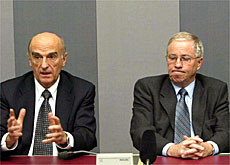Status quo wobbles under rightwing assault

After recent dramatic political changes in the government, 2004 promises to be a pivotal year in Swiss politics.
Most attention will be focused on the rightwing Swiss People’s Party, which now has two cabinet ministers and is the largest party in parliament.
With its charismatic driving force, Christoph Blocher, joining party colleague Samuel Schmid in the seven-strong cabinet, the People’s Party has “lost” its most outspoken critic of government policy.
That is because Blocher has promised to abide by the rules of consensus, whereby the cabinet presents a united front on issues. He will inevitably at times find himself defending policies which he finds abhorrent.
But political analyst, Jeremias Blaser, believes that the influence Blocher has on new policy areas, in a cabinet that has clearly shifted to the Right, will be far more revealing than how he deals with existing policy decisions.
“The media and the political elite will be watching very closely what happens in the government and in particular how Blocher is going to act,” he told swissinfo.
“There’ll also be a lot of interest in how the People’s Party reacts to government decisions, and how the relationship evolves between Blocher and his own party.”
Independent
Blocher became Switzerland’s new justice minister on January 1.
It is a post that will see him presenting the government’s position on issues such as asylum, citizenship and same sex partnerships – all areas in which he and his party hold well-publicised views that run counter to government policy.
Blaser believes that on these issues at least, Blocher will not have much room to manoeuvre, but his party could still make political mileage in nationwide votes.
“Right after Blocher’s election, the People’s Party showed clearly that it considered itself independent, and was not going to keep a low profile and stop its opposition policy just because Blocher was now in government,” he said.
“There are enough people in the party who can speak out publicly regardless of what Blocher is saying, knowing very well that he might be in the minority in the government,” he added.
Aliki Panayides, vice-secretary general of the People’s Party, insists the party will not be weakened because its most prominent member is no longer able to participate in the public debate on certain issues.
“There are lots of people that can defend the party’s programme, even if Blocher is in government,” she told swissinfo.
“The party is there to fight for the political programme in which it believes, and Blocher will see what he can do best for the programme in government.”
Strong-willed
How much influence Blocher wields within the cabinet could prove crucial in determining policy over the next four years.
Blaser thinks a lot will depend on how involved Blocher is in the work of his six colleagues.
“If he does it openly, that would be quite a new development,” he said.
“He has said he will spend around 50 per cent of his time for his own department and the rest on his colleagues’, so I think he’ll certainly have strong opinions on what should be happening in the interior ministry, for example.”
The interior ministry will be putting forward proposals for the reform of the state pension scheme next year, one area in which Panayides admits the People’s Party will want to have more of a say.
And although it cannot control the government purse strings, the party has a useful ally at the finance ministry in the shape of the newly elected centre-right Radical, Hans-Rudolf Merz, who is generally considered to be on the Right of his party.
“Switzerland needs a financial change – less debt – and I am sure Blocher will point to the costs involved in each area,” said Panayides.
“And I’m sure he’ll be convincing because he’s very strong-willed and I am sure he will save the country money.”
Alliances
Two policy areas Blocher and the People’s Party are likely to pursue vigorously are asylum and relations with the European Union.
After narrowly losing a nationwide vote last year to tighten Switzerland’s asylum law, the People’s Party is currently putting together proposals to force a third vote on the issue.
The party is also against Switzerland joining the EU’s accords on cross-border crime and asylum – Schengen-Dublin – one of ten new bilateral agreements currently being negotiated by Bern and Brussels.
Panayides admits that the People’s Party – staunchly against eventual Swiss membership of the EU – is likely to force a debate on the issue of closer ties with Brussels.
“I’m sure many of those people who are in favour of Switzerland joining the EU are a little shocked by Blocher now being in the government,” she said.
“We have to decide what to do about Europe and I hope people will realise that it’s better to agree bilateral conditions that we declare are good for us, rather than having them dictated by the EU.”
But how far the party and Blocher can really influence policy decisions at both governmental and parliamentary levels will depend – as it so often does in Swiss politics – on making deals.
“The party might be the biggest in parliament but it doesn’t have a majority, so it needs alliances,” said Blaser.
“It can only make a difference if it can engage in stable and sustainable alliances because alone, it cannot make a difference.”
swissinfo, Jonathan Summerton
Christoph Blocher took over at the justice ministry on January 1.
The People’s Party won 26.6 per cent of the popular vote in October’s parliamentary elections to become the largest party in parliament with 63 seats.
In a November 2000 foreign policy statement, Switzerland stated its intention to join the European Union – the People’s Party is staunchly against EU membership.
Nationwide votes are expected during 2004 on automatic citizenship rights for third generation immigrants, same sex partnerships and statutory maternity benefit – all of which the People’s Party opposes.

In compliance with the JTI standards
More: SWI swissinfo.ch certified by the Journalism Trust Initiative



You can find an overview of ongoing debates with our journalists here. Please join us!
If you want to start a conversation about a topic raised in this article or want to report factual errors, email us at english@swissinfo.ch.